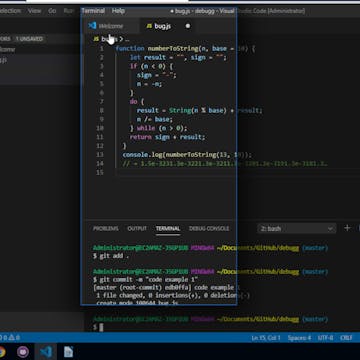
Good to know
Save this course
Activities
Debug coding challenges
Show steps
Solve coding challenges to practice debugging skills.
Show steps
-
Find coding challenges online.
-
Attempt to solve the challenges without using a debugger.
-
Use a debugger to identify and fix errors.
Create a visual debugger
Show steps
Develop a visual debugger to practice implementing debugging strategies.
Show steps
-
Design the visual interface for the debugger.
-
Implement the core debugging functionality.
-
Test and refine the debugger.
Attend a debugging workshop
Show steps
Engage with experts and peers to learn advanced debugging approaches.
Show steps
-
Find a debugging workshop that aligns with your interests.
-
Register for the workshop and prepare any necessary materials.
-
Attend the workshop and actively participate in discussions.
Three other activities
Expand to see all activities and additional details
Show all six activities
Contribute to an open-source debugging tool
Show steps
Enhance your debugging skills and contribute to the community by participating in open-source projects.
Show steps
-
Find an open-source debugging tool that interests you.
-
Review the documentation and codebase of the tool.
-
Identify areas where you can contribute.
-
Make a pull request with your contributions.
Write a debugging tutorial
Show steps
Create a tutorial to enhance your understanding of debugging concepts and share knowledge with others.
Show steps
-
Identify key debugging concepts.
-
Develop a step-by-step guide to debugging.
-
Write the tutorial.
-
Share the tutorial with others.
Read "Debugging with GDB: The GNU Source-Level Debugger"
Show steps
Gain a deeper understanding of advanced debugging techniques through a comprehensive book.
Show steps
-
Obtain a copy of the book.
-
Read the book thoroughly, taking notes and highlighting important concepts.
-
Apply the debugging techniques described in the book to your own code.
Debug coding challenges
Show steps
Solve coding challenges to practice debugging skills.
Show steps
- Find coding challenges online.
- Attempt to solve the challenges without using a debugger.
- Use a debugger to identify and fix errors.
Create a visual debugger
Show steps
Develop a visual debugger to practice implementing debugging strategies.
Show steps
- Design the visual interface for the debugger.
- Implement the core debugging functionality.
- Test and refine the debugger.
Attend a debugging workshop
Show steps
Engage with experts and peers to learn advanced debugging approaches.
Show steps
- Find a debugging workshop that aligns with your interests.
- Register for the workshop and prepare any necessary materials.
- Attend the workshop and actively participate in discussions.
Contribute to an open-source debugging tool
Show steps
Enhance your debugging skills and contribute to the community by participating in open-source projects.
Show steps
- Find an open-source debugging tool that interests you.
- Review the documentation and codebase of the tool.
- Identify areas where you can contribute.
- Make a pull request with your contributions.
Write a debugging tutorial
Show steps
Create a tutorial to enhance your understanding of debugging concepts and share knowledge with others.
Show steps
- Identify key debugging concepts.
- Develop a step-by-step guide to debugging.
- Write the tutorial.
- Share the tutorial with others.
Read "Debugging with GDB: The GNU Source-Level Debugger"
Show steps
Gain a deeper understanding of advanced debugging techniques through a comprehensive book.
Show steps
- Obtain a copy of the book.
- Read the book thoroughly, taking notes and highlighting important concepts.
- Apply the debugging techniques described in the book to your own code.
Career center
Software Architect
Software Engineer
Web Developer
Mobile Developer
Data Scientist
Machine Learning Engineer
DevOps Engineer
Quality Assurance Analyst
Software Tester
Reading list
Share
Similar courses
OpenCourser helps millions of learners each year. People visit us to learn workspace skills, ace their exams, and nurture their curiosity.
Our extensive catalog contains over 50,000 courses and twice as many books. Browse by search, by topic, or even by career interests. We'll match you to the right resources quickly.
Find this site helpful? Tell a friend about us.
We're supported by our community of learners. When you purchase or subscribe to courses and programs or purchase books, we may earn a commission from our partners.
Your purchases help us maintain our catalog and keep our servers humming without ads.
Thank you for supporting OpenCourser.



